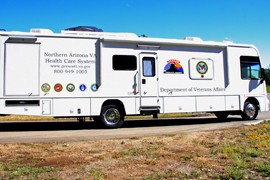Cronkite News has moved to a new home at cronkitenews.azpbs.org. Use this site to search archives from 2011 to May 2015. You can search the new site for current stories.
Mobile clinic finally goes mobile to take health care to Navajo veterans
WASHINGTON – After sitting in one place since 2011, a mobile health clinic will leave Chinle and travel for the first time Tuesday on its mission to bring care to veterans in remote parts of the Navajo Nation.
The Department of Veterans Affairs clinic will travel to Pinon, a rural town in the Navajo Nation, to help make health care more accessible care to the roughly 2,000 veterans in that area, said Rod Sepulveda, rural health program coordinator for the department.
In coming months, the clinic is also expected to travel to Tsaile, another rural town on the reservation.
Many Navajo veterans have limited access to transportation and it was common for them to hitchhike to the VA hospital in Prescott for care, Sepulveda said.
Since the clinic opened in Chinle, he said, 38 veterans with post-traumatic stress disorder have been diagnosed there and a total of about 325 veterans have been treated.
Shawndin Tracy, the mobile clinic’s health technician, said the number of patients coming for treatment has slowly increased since it opened and that veterans have been impressed with the telehealth care that lets the clinic conference in real time with doctors in Prescott.
“The veterans that come through our door have been so thankful,” she said.
Ruthie Hunter, a VA social worker in Chinle, said veterans have been asking for a mobile clinic since before she started working on the reservation in 2008.
“I think the VA is pioneering services by going out to the people,” Hunter said.
An agreement between Indian Health Services and the VA in 2010 laid the framework for a local agreement to open a mobile clinic, said Ron Tso, the CEO for a IHS hospital in Chinle. But it took over a year of negotiations and meetings with each of the 16 local Navajo councils in the Chinle area to finalize an agreement.
“It takes a lot of legal reviews,” to open mobile clinic like this, Tso said.
While Native American veterans can receive care at any Indian Health Services hospital, VA staffers are better trained to identify and treat post-traumatic stress disorder and traumatic brain injuries, Sepulveda said.
The VA clinic can also provide more integrated care by viewing both a veteran’s health records in both the VA and Indian Health Services systems to make sure patients are not getting multiple prescriptions for the same ailment.
Cassandra Morgan, a Navajo and a Marine Corps veteran, said she appreciates the effort the VA is putting into the mobile clinic. But Morgan, an advocate for veterans health, said the effort would be more effective if there was better communication with the community.
“They never ask us what we need,” she said.
While it may work for some, not all veterans will feel comfortable being treated in a mobile van, she said.
“They don’t trust it, they don’t know what it’s about,” Morgan said.
To improve care, VA staffers must build a relationship of trust and educate veterans so they understand what services they can ask for, she said.
Despite potential obstacles and the length of time it can take to get anything done, Morgan said, all the agencies involved should be able to work together to continue to improve care for veterans.
“Funding or not, let’s work together,” she said.
The mobile clinic is just one effort by the VA to expand health care in Indian Country. In 2012, the agency opened two telehealth clinics in Navajo Nation border towns, Page and Holbrook, and talks are scheduled to start in June to add a third clinic in Second Mesa on the Hopi Reservation.







